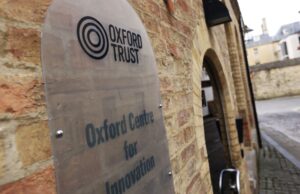New report highlights impressive growth of science and technology business base in Oxfordshire
July 14, 2016

George Freeman MP, Parliamentary Under-Secretary and Minister for Life Sciences, today launched a report which assesses the progress Oxfordshire has made over the last few years in realising the growth potential of its high technology business cluster to produce greater economic benefits for the county and the UK.
Entitled “The Oxfordshire Innovation Engine Update Report – realising the growth potential”, the independent report was produced by leading economic consultants, SQW.
The report was commissioned by the University of Oxford with support from The Oxford Trust – Science Oxford’s parent body, the Oxford Academic Health Science Network and the Oxfordshire Local Enterprise Partnership. The original Oxfordshire Innovation Engine Report, published in October 2013, analysed the factors that have led Oxfordshire to become one of the UK’s most significant centres for science-based research and enterprise. The Update examines what has changed since 2013, based on wide ranging consultations with representatives from business, research, local government and finance, and on analysis of the most recent employment and other data, for example on employment, research spending and investment.
The SQW report highlights the opportunities for the high technology business cluster in Oxfordshire to contribute hugely to national economic growth to create great opportunities for the county’s young people, ands to contribute to providing a high quality of life for all.
Key findings from the report demonstrate:
- High tech employment increased by over 7% 2011-14 to around 46,000 – faster than forecast
- Most of the high tech firms interviewed originally in 2013 have grown substantially over the last three years, both in Oxfordshire and overseas
- The scale of investment secured by Oxfordshire’s high tech firms in 2015 was unprecedented, and provides those firms with the funding needed for substantial further growth
- Provision of space for high tech businesses has improved – both for established firms (e.g. at Harwell, Milton Park) and new starts (e.g. Oxford Bioescalator, Begbroke Innovation Accelerator)
- The availability of funding for firms has improved, particularly long term risk capital for high tech firm, through the establishment of two major new funds: Oxford Sciences Innovation, and the Woodford Patient Capital fund.
The report identifies a number of priorities to ensure Oxfordshire continues to realise its growth potential. These include:
- Increase housing delivery to match the scale of demand and address affordability issues: housing completions in Oxfordshire have increased faster than the national average, but are still less than half the objectively assessed requirement. Affordability issues have worsened.
- Push for more public and private investment in Oxfordshire’s infrastructure: there have been some significant transport improvements (e.g. new Oxford Parkway station and direct fast access to London Marylebone) but congestion on Oxfordshire’s roads has increased.
- Strengthen the business voice in making the case for growth and promoting Oxfordshire: the county has benefitted from some new networks (eg the AHSN) and strengthening of some existing (eg OBN), but the networks are fragmented; very little is cross sectoral. The need for a strong business voice to make the case for growth is more important than ever.
- Agree a devolution deal to give the local area more responsibility and resources for the infrastructure and services needed to support growth.
Speaking at the launch at Said Business School, Professor Sir John Bell of the University of Oxford, said: “We decided to commission this report with local partners to understand what progress has been made over the last few years in building on Oxfordshire’s position as a leading high technology cluster, and to identify priorities for the future.
“Oxford University is committed to playing a full role in growing the high tech cluster. For example, our involvement in setting up the Oxford Sciences Innovation fund demonstrates our commitment to ensure that more of the research undertaken in Oxfordshire results in local commercial applications and benefits. We also intend to continue to work with other stakeholders to address the challenges and opportunities identified in this report.”
George Freeman MP, Parliamentary Under-Secretary (BIS) and Minister for Life Sciences said: “Innovation is crucial to the competitiveness of the UK – leading to new products and services and creating better jobs and sustained prosperity. I am delighted to launch this Update to the Oxfordshire Innovation Engine report, which provides evidence of Oxfordshire’s ever increasing role in the UK economy.
“This report demonstrates significant progress over the last few years in growing the high tech cluster and thereby creating new job opportunities and increased spending in the local economy. This is exactly what the UK needs – commercial exploitation of its outstanding research and innovation capabilities to create prosperity for all. Many of Oxfordshire’s high tech firms are already major exporters, and are developing and producing leading edge products and services which have the potential to change the world for the better.
Highly successful local entrepreneur and former science minister Lord (Paul) Drayson said: “This report is timely. Its launch coincides with a period of uncertainty about our economic future, therefore its strongly positive message about the recent growth of science and technology based firms and research in Oxfordshire, and the opportunities for the future, is very welcome. It underlines how important maintaining that growth will be.
“We all – in both private and public sectors – should do what we can to ensure Oxfordshire provides the right conditions for the ‘Innovation Engine’ to continue to generate jobs, create wealth and deliver improvements to the quality of life for everyone who lives and works in the region.”



